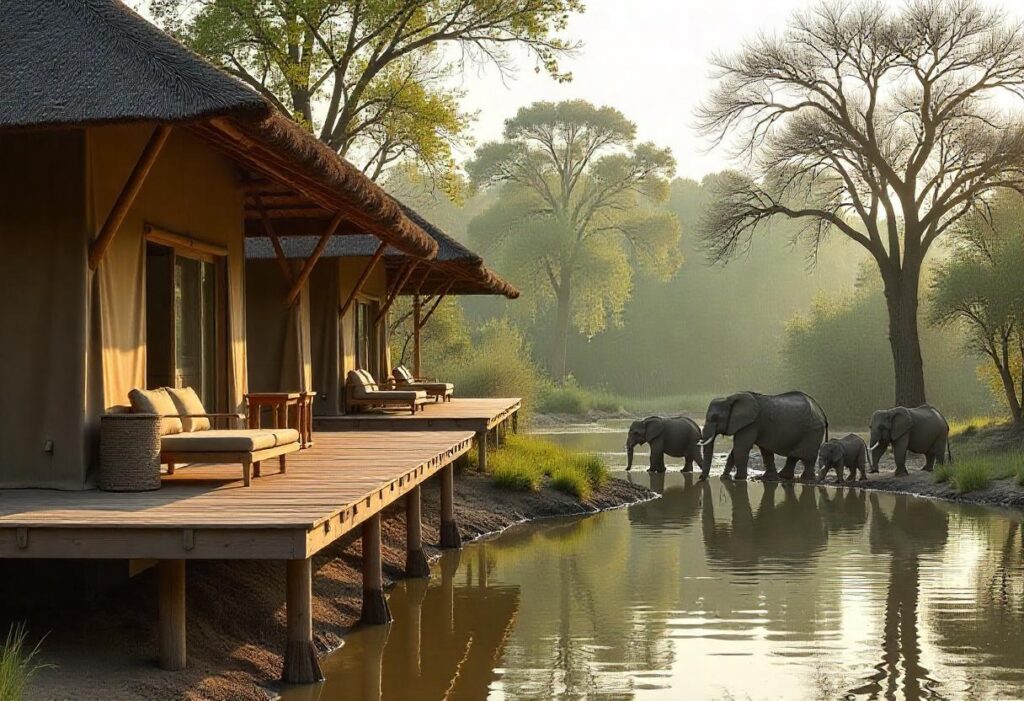Travel consciously without sacrificing comfort. Here’s how to make sure your safari stay supports sustainability and wildlife protection.
Why choosing eco-friendly safari lodges matters
Sustainable tourism is not a trend—it’s a necessity. Opting for eco-conscious safari accommodations helps conserve wildlife, protect natural resources, and uplift local communities. These lodges operate with the environment in mind, reducing waste, conserving energy, and often investing back into the surrounding ecosystem.
Key features of eco-friendly safari accommodations
Renewable energy sources
Look for camps and lodges that use solar power or wind energy to minimize carbon emissions.
Water conservation practices
Eco-lodges often have greywater recycling systems, low-flow fixtures, and policies that reduce unnecessary water usage.
Responsible waste management
Plastic-free initiatives, composting, and proper recycling are indicators of a property’s environmental commitment.
Sustainable construction
Many eco-camps are built with local, natural materials and designed to blend into the landscape with minimal impact.
Supporting local communities and conservation efforts
Community partnerships
Responsible lodges hire locally, invest in education and healthcare, and collaborate with surrounding villages.
Conservation funding
Eco-lodges frequently contribute a portion of their profits to wildlife protection, anti-poaching patrols, or habitat restoration.
Cultural respect and education
Choose accommodations that offer authentic cultural experiences in respectful, non-exploitative ways.
Questions to ask before booking
- Is the lodge certified by an eco-tourism body (like EcoTourism Kenya or Fair Trade Tourism)?
- What percentage of staff is hired locally?
- Do they support conservation projects or community initiatives?
- Are there sustainable transport options available from the lodge?
Destinations leading in sustainable safari stays
Kenya
Home to award-winning eco-camps in the Maasai Mara and Amboseli that actively support both conservation and community development.
Tanzania
From the Serengeti to the Ngorongoro, Tanzania features several lodges built with minimal impact and strong local partnerships.
Botswana
Known for its low-volume, high-impact tourism model, Botswana offers some of Africa’s most sustainable safari accommodations.
Tips for being a responsible safari guest
- Bring reusable water bottles and avoid single-use plastics.
- Be mindful of water and electricity usage.
- Choose tour operators aligned with sustainability principles.
- Respect wildlife and stay on designated paths or tracks.
Final thoughts
Choosing eco-friendly safari accommodations is one of the most impactful decisions you can make as a traveler. By staying at lodges that prioritize sustainability, you help protect Africa’s landscapes and wildlife for generations to come.
FAQs
Look for globally recognized certifications like Green Globe, Fair Trade Tourism, or EarthCheck to ensure the lodge meets environmental and ethical standards.
Not always. While some may charge more due to sustainable operations, many offer competitive rates and include added value like community experiences.
Check if the lodge employs local staff, sources food and materials locally, or funds education and conservation initiatives in the area.
Be cautious of vague claims like “eco-friendly” without specific actions, lack of transparency, or no mention of sustainability practices or partnerships.
Yes, many sustainable lodges offer high-end experiences, including fine dining, spa treatments, and elegant design, all while minimizing environmental impact.






